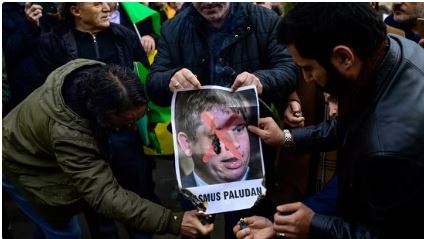
Turkish protestors are demonstrating for the second consecutive day after a Swedish activist burnt a copy of Quran as a sign of protest against Islam and immigrants in the country.
Tension between Sweden and Turkey is soaring as both the countries are caught in the middle of a diplomatic conflict that led to a series of demonstrations and protests. In the recent development, outrage broke out in Turkey after a Danish activist Rasmus Paludan set Quran, the holy book of Islam, on fire outside the Turkish Embassy in Stockholm on January 21. People in Ankara and Istanbul started protesting against the act and condemned Sweden for “state-supported Islamophobia”.
On January 22, protestors in Turkey carried green flags proclaiming their faith along with a banner saying, “We condemn Sweden’s state-supported Islamophobia”. However, A sign on a window of the Swedish Consulate in Ankara read, “We do not share that book-burning idiot’s view”.
Friction between two countries originated after Turkey held up Sweden and Finland’s applications to join the NATO alliance. Both the Scandinavian countries applied to join the alliance following Russia’s attack on Ukraine. Turkey, already a NATO member, using its power to hold the applications under certain conditions – deporting its President, Recep Tayyip Erdogan’s critics and claiming Kurds as terrorists. The recent protest has likely narrowed down the chances of applications getting ratified.
Registering their disagreement, demonstrators in Sweden hanged the Turkish President’s effigy. Surrounded by police, Paludan set fire to the holy book with a lighter following a long diatribe of almost an hour, in which he attacked Islam and immigration in Sweden. About 100 people gathered nearby for a peaceful counter-demonstration.
A separate protest was carried out in the city supporting Kurds and against Sweden’s bid to join NATO. A group of pro-Turkish demonstrators held a rally outside the embassy. All three events had police permits.
On January 21, Swedish Prime Minister Ulf Kristersson said in a tweet that freedom of expression is crucial however, “what is legal is not necessarily appropriate”.

Leave a Reply